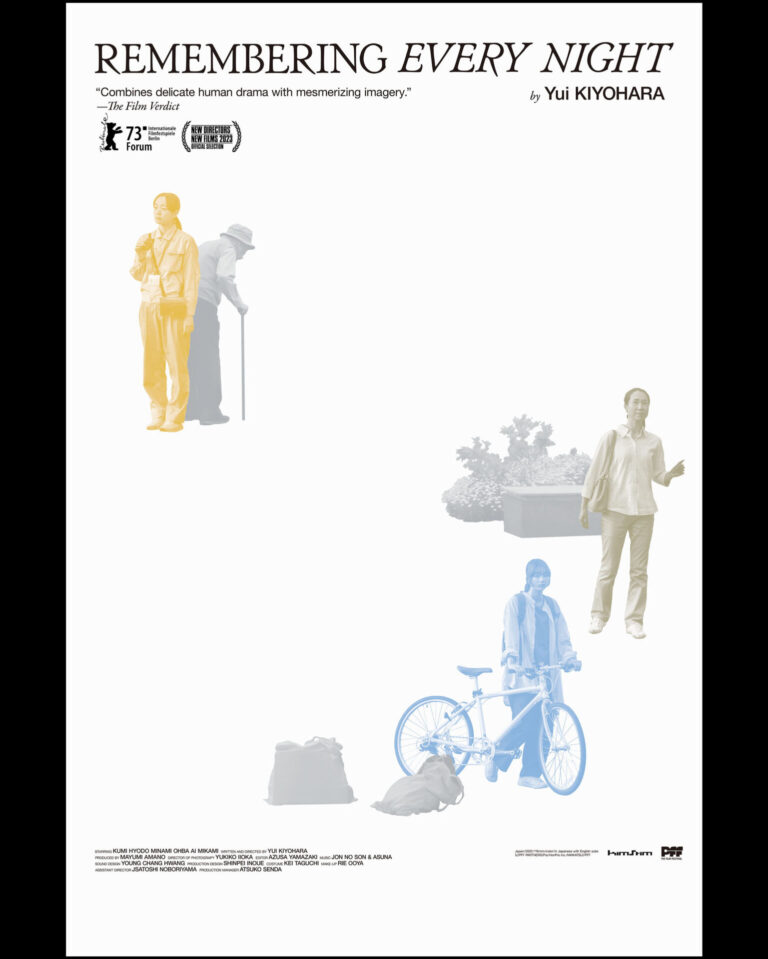
Yui Kiyohara studied under directors Kiyoshi Kurosawa and Atsuhiko Suwa. Her first feature film “Our House,” shot as a graduation project for the graduate school of Tokyo University of the Arts, won the Grand Prix at the Pia Film Festival 2017, and she has received a string of invitations from abroad, including the Berlin International Film Festival and the Hong Kong International Film Festival.
“Remembering Every Night“
Synopsis : A story of three women, weaved in the “Tama New Town” suburbs of Tokyo, opened in 1971 as the country’s largest-ever residential housing project. One person’s precious memory resonates through one day in the life of another.
Genre: Drama
Original Language: Japanese
Director: Yui Kiyohara
Producer: Mayumi Amano
Writer: Yui Kiyohara
Release Date (Theaters): Limited
Runtime:
Distributor: KimStim
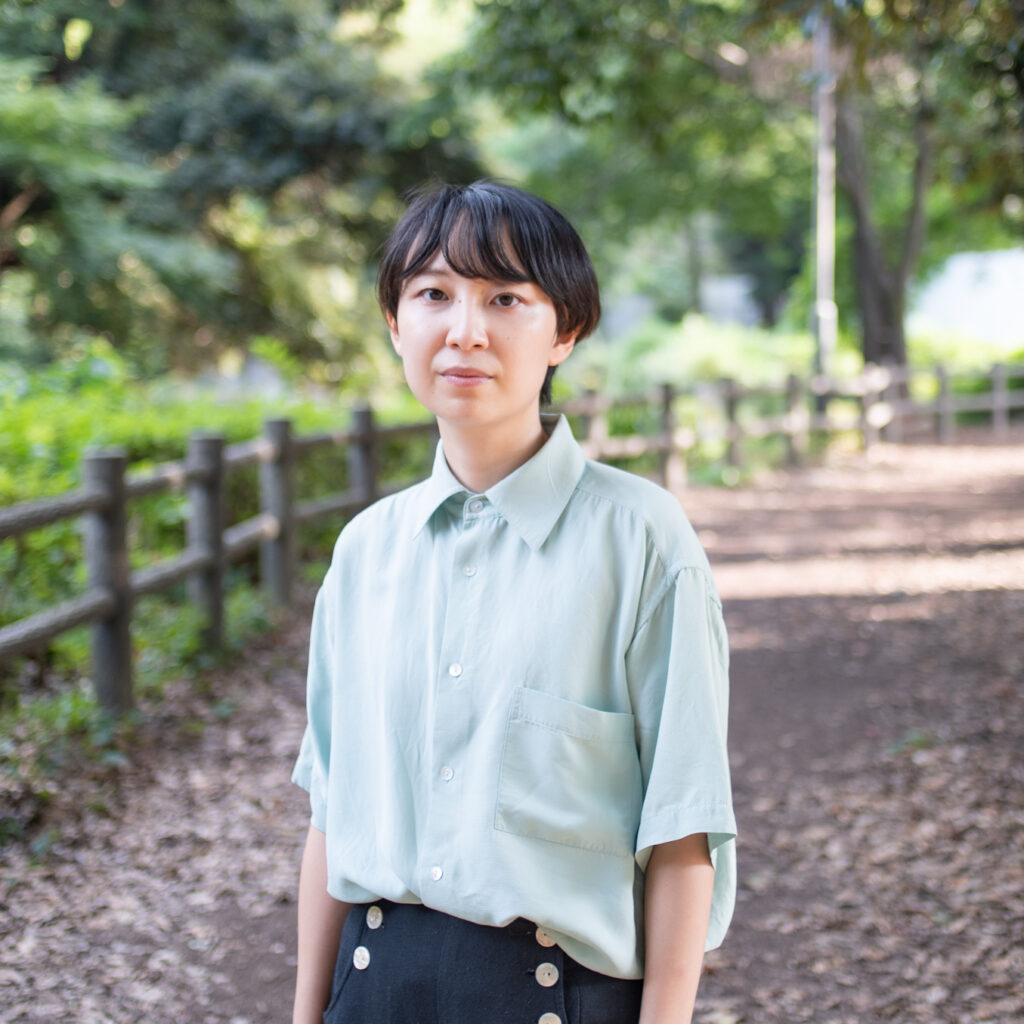
Exclusive Interview with Director Yui Kiyohara
Q: How did you decide on the concept of following three women who pass by each other as time proceeds in Tama New Town?
Yui Kiyohara: I’ve lived in Tama New Town since I was a child, and it was a very special place for me. I wanted to make a film about it someday. Initially, I wanted to shoot in Tama New Town, and also wanted to depict three women of different generations. That’s where I started. Originally, there were several completely different projects before this film, but they were also about three women of different generations.
For various reasons, the projects changed, but the idea of three women of different generations remained the same and this project was born. I also walked around Tama New Town, and there really wasn’t a part of the town that I didn’t know. I walked so much that I thought I knew almost all the streets. I wanted to make a film in which people encounter various people and memories as they walk the streets.
I also wanted to make a film about Tama New Town, but, in the course of my research, I learned about the women of Tama New Town in the ‘70s and ‘80s, when the Town was first established. I was also very interested in the infrastructure that the town lacked and the fact that at that time there were still many white apartment buildings standing in the wilderness, and looked very inhuman. There were no hospitals, train stations, libraries, and so on. So the women stayed in the town and built a New Town in Tama while their husbands were away in the city.
Although the aging of the population continues, and the air is a little colder than it used to be, it’s lush with greenery and is a beautiful place. I heard that they originally intended to create a utopia in Tama New Town, but I thought that some of its parts look more like a utopia now. I made this film with the hope that I could include the various layers of time that existed within each town.
Q: There’s an opening sequence of the film, the young people are trying out the performance of the band in one shot. Were the lines in the script written in advance and uttered by the performers from the beginning, or, once you met those performers, you let them speak naturally in the film?
Yui Kiyohara: In the opening sequence, the actors aren’t actors but members of the band, Jon no son — the musicians who made the background music (the Incidental sounds) for the film. I wanted the band members to appear in the movie because I thought it would be nice if the music itself was a character in the film, rather than the way the music has been used to accompany the characters or to emphasize their emotions.
I wanted to have a scene of musicians playing in the city at the beginning of the film so that the audience could hear the sound of the music in the city. The only sequence which had no written dialogue was that one in which the musicians were actively involved. The way time flows may be a little different from other sequences, but I felt that I could show a kind of time of the city there, a time in which people are present in the landscape, a time not only for people but also for the city.
Q: In this film, you showed the audience slowly through long shots, such as images of outside scenery through the window seen from the kitchen and the outside scenery seen from the bus. That slowly showed the time when the natural images flowed in a tranquil way. Cinematographer Yukiko Iioka, who had worked with Ryusuke Hamaguchi on his film “Wheel of Fortune and Fantasy,” is working with you here. What did you two talk about beforehand and how did you want to shoot the film while capturing the scenery in your mind?
Yui Kiyohara: Basically, we didn’t decide in a detailed meeting beforehand how to shoot the film. Yukiko Iioka’s shooting style, as I see it, is not so much about her being in front of the camera and shooting a fictional film, but rather about how she sees what’s happening in front of eyes, which is something we are making, from her own point of view, as a document of what is in front of her.
I think it is fascinating that she is able to look at the document of what is in front of her from her own point of view, not to look at it with us, but to see something unexpected happening in front of her even though we are making it. As we shot with this in mind, we naturally ended up with this kind of rhythm, long shots, and so on. We didn’t decide on a style from the beginning, and then went with that style for this film.
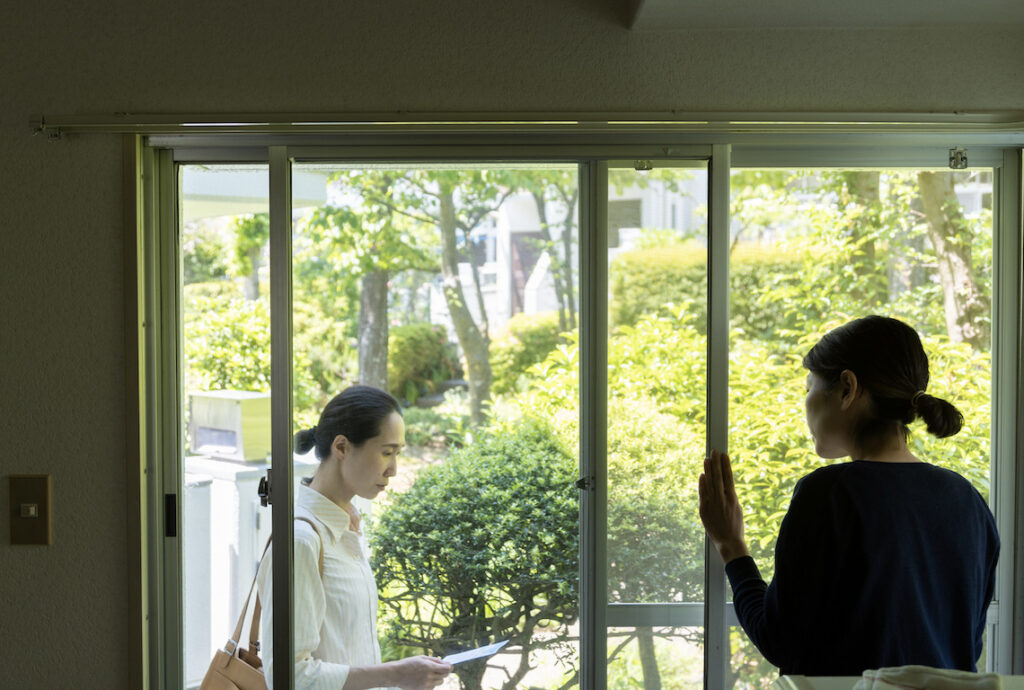 @Remembering Every Night Kumi Hyodo
@Remembering Every Night Kumi Hyodo
Q: Kumi Hyodo plays a woman named Chizu, who has been laid off from her job and is looking for work on “HelloWork.”[HelloWork is the Public Employment Security Office, a comprehensive employment service operated by the government that provides a variety of services free of charge to people looking for work and to employers who are hiring]. She talks about dressing in kimonos for her work in the past and sleeping in a library. She also said on HelloWork, “Today is my birthday,” which somehow gives the impression that she’s single. It was interesting to express the characters’ personalities without giving too much background or information. What did you have in mind in terms of creating these three female characters?
Yui Kiyohara: If you give out too much information, you sometimes lose sight of the characters. That’s why I thought that by having information such as “this person is single,” “married,” “divorced,” etc., the viewer may unknowingly attach a kind of label that he or she originally has for that role. The distance between the three characters in this film is such that they don’t really meet, but theyre’ looking at each other. For example, I wanted to make a film in which you see people in the same bus as you, people you might find interesting, and there is a moment when you start to see them in a certain way.
I wanted to make a film in which you see people from such a distance and know them. Of course, I wrote the script and directed the actors, but after the decision was made, I met and talked with the actors to find out what kind of people they are. I also walked around Tama New Town with them and made changes to the script in the hope that I could fuse their charms with those of the cast.
Q: Ai Mikami seemed to be an actress with sharp eyes and a strong presence just by standing still. Shee is a very attractive young actress. How did you cast her?
Yui Kiyohara: I had some kind of connection with the other two actresses, but I had only seen Ms. Mikami in films. When I thought about what kind of person I wanted to play the character of Natsu, I thought that she had a very modern college student look. I thought she had a presence just by being there, like they were a little unreadable, and they didn’t know what she was thinking at first glance.
I cast the other two actresses with this in mind as well. It is very important to have people in the city, which sounds simple but is very difficult to do when creating a fictional story.It is very important for this film to make it convincing that these actresses are standing and breathing on the ground in the city, even though they don’t actually live there. I cast people who could do that.
Q: The depiction of men in the film, such as an employment agent at HelloWork, who, in his conversation, says that he forgot about his interview with Chizu. He even mentioned that there were so many housewives at HelloWork, even though Chizu is single. On the other hand, the bus driver did not tell Chizu where to get off and where to go when she asked him where she was. It depicted a way men have of treating a very middle-aged woman. Were you conscious of that in your portrayal of men in this film, particularly in their attitudes towards a middle-aged woman?
Yui Kiyokara: There are cases where she is excluded from men’s romantic interests, and deviant behavior is not tolerated simply because she is a middle-aged woman. In Japan, people who are a little unusual tend to attract attention. I think that middle-aged women who do strange things often attract a lot of attention, or at least, unwanted attention. I wanted to include this perspective in my depiction of Chizu.
I wanted to depict women in their 20s and 30s, and Chizu in her 40s. I felt that women’s lives have completely changed depending on their age, and there are aspects of that change due to social factors, so I chose women of different generations to show the differences in their lives. I had an image of a Tama New Town that had been built by women and where women are still walking around. So, in this film, the men’s presence is rather weak, or perhaps less than the women’s. I made the film in such a way that the center of gravity is on the women.
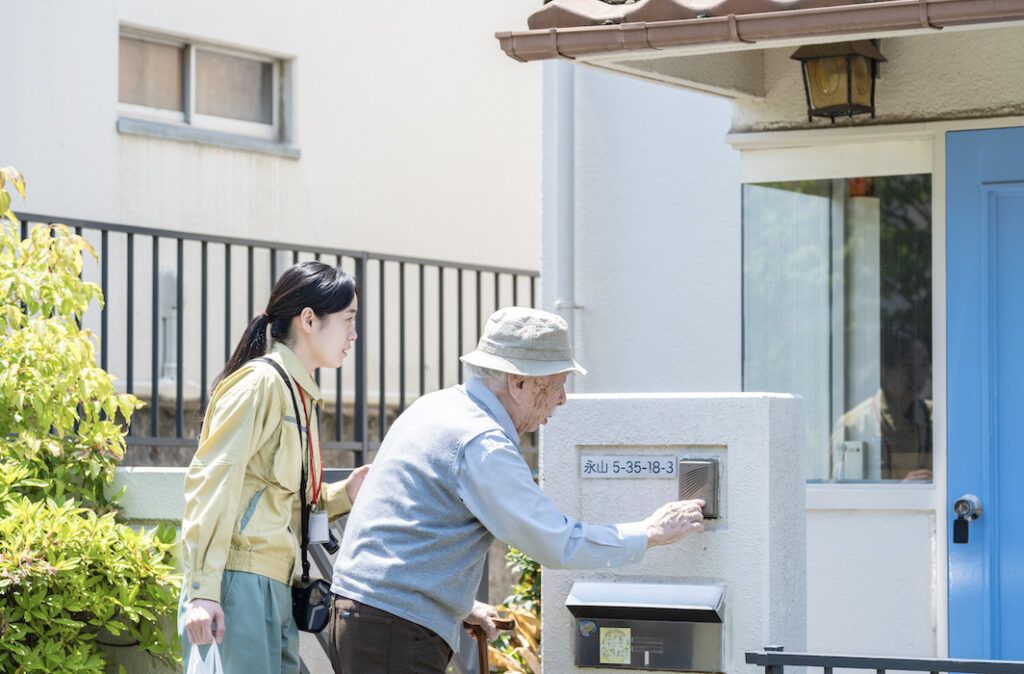 @Remembering Every Night Minami Ohba and Tadashi Okuno
@Remembering Every Night Minami Ohba and Tadashi Okuno
Q: Following your film “Our House,” this film was also selected at the Berlin International Film Festival. How was their reactions different from the ones in Japan?
Yui Kiyohara: What surprised me was that I thought the scenery of Tama New Town was rather Japanese, but when I was approached by people, especially from Asia, I heard from many people that it was very similar to their hometown. The scenery in this film was connected to their memories, even though they were from completely different countries.
In a sense, there is something universal about this film. I had always thought that similar housing complexes lined up in rows can be found not only in Asia, but also in socialist countries, but I realized that there is a kind of universality that people feel about such landscapes. I became interested not only in the New Town in Tama, Japan, but also in other countries.
Q: This film is a PFF Scholarship film, but does it provide support not only in terms of production funding, but also in terms of staff, etc.?
Yui Kiyohara: First of all, the production was fully funded, we have had a producer who does most of the production of the films of the people who have received the scholarship funds. That person is in charge as a producer.
Q: Did you select most of the technical staff?
Yui Kiyohara: Yes. As for the rest of the staff, I mostly asked people who I wanted to work with.
Q: What kind of urban and social development of Tama New Town did you feel empathy for, and why did you choose it for this film?
Yui Kiyohara: When Tama New Town was built, people were looking for a utopia, and it was a top-down utopia created by artificially destroying mountains. Although I did not directly see what it looked like at that time, I had the impression that such a place had become a very human place about 50 years later. I thought it would be great to see things that are created because people live there, things like people building gardens in common areas without permission, even though they are not really allowed to do so, and so on.
I thought it was very nice. I really sympathized with the landscape of the artificial standardization of the city that was being built by the hands of people. When I thought about how I could film such scenery, I thought it would be great if I could show how people were walking on their own feet, seeing and feeling the city, and then having their own memories overlap with and touch the memories that are there. I wanted to show that through the film. This is what I felt when I was walking in the city.
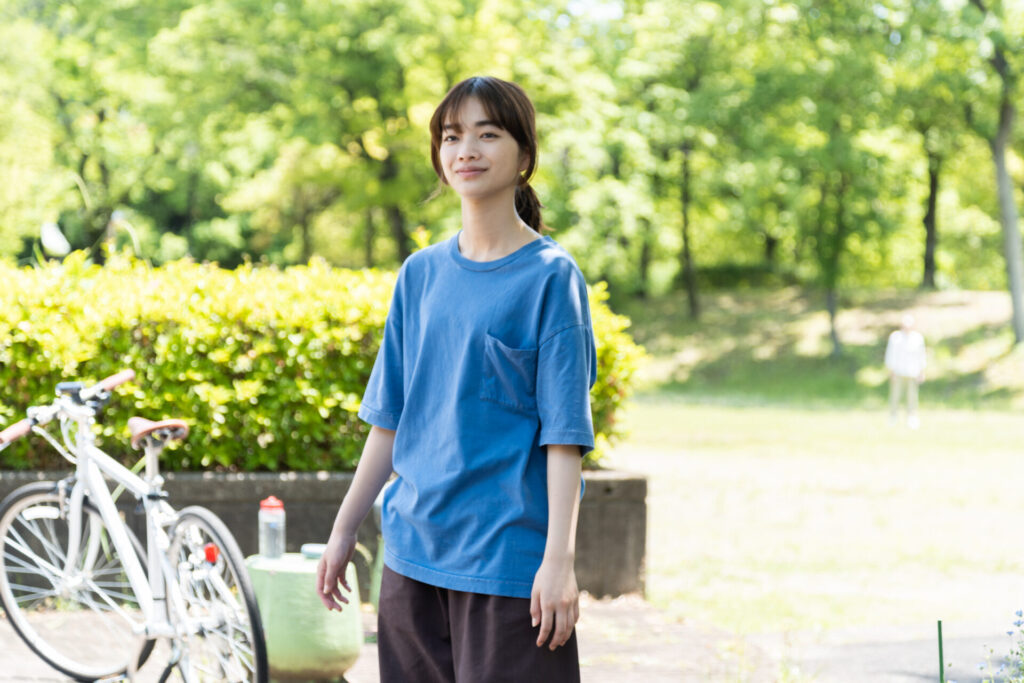 @Remebering Every Night Ai Mikami
@Remebering Every Night Ai Mikami
Q: Talk about your collaboration with sound designer Young Chang Hwang. The sound is used in a way that doesn’t get in the way of the images — it was a very natural process.
Yui Kiyohara: Mr. Hwang’s sound is really wonderful. His style is to basically incorporate sounds that were heard in the city and other sounds that were heard rather naturally. It’s really wonderful that the film was made in a style where various sounds are shared and incorporated into the film, rather than in the direction of organizing them as in a normal film.
But it’s not just about capturing the realistic sounds of the place; there are planes passing through Tama New Town, and he reconstructs the noise of planes and other memorable sounds in the film — which is a bit insidious — but I really liked the way he did it casually yet in a very exciting way.
Q: In “Our House” and “Remembering Every Night,” you depicted women of different generations. What kind of subjects would you like to draw on in the future?
Yui Kiyohara: I don’t have a specific idea in mind yet, but I am interested in women’s stories, and as part of my research on Tama New Town, I talked to quite a few women who moved in during the early stages of their tenancy. I would like to continue to create works based on the stories of women who lived through various periods.
Q: Have you already started writing the script now?
Yui Kiyohara: I’m not writing it right now. I’ve been working on a film for a while now which I just finished, but it’s a film about my grandmothers from both my father and mother’s side. They were women who lived in completely different eras than I did, so their perspectives were different from mine. They are not historically famous at all, but I often feel that there’s something very important in the issues faced by ordinary people. I would like to continue to make these types of films in the future.
Check out more of Nobuhiro’s articles.
Here’s the trailer of the film.

